Unit 7 Will people have robots?Section A 3a-3c 课件(共22张PPT) 人教版八年级英语上册
文档属性
| 名称 | Unit 7 Will people have robots?Section A 3a-3c 课件(共22张PPT) 人教版八年级英语上册 | 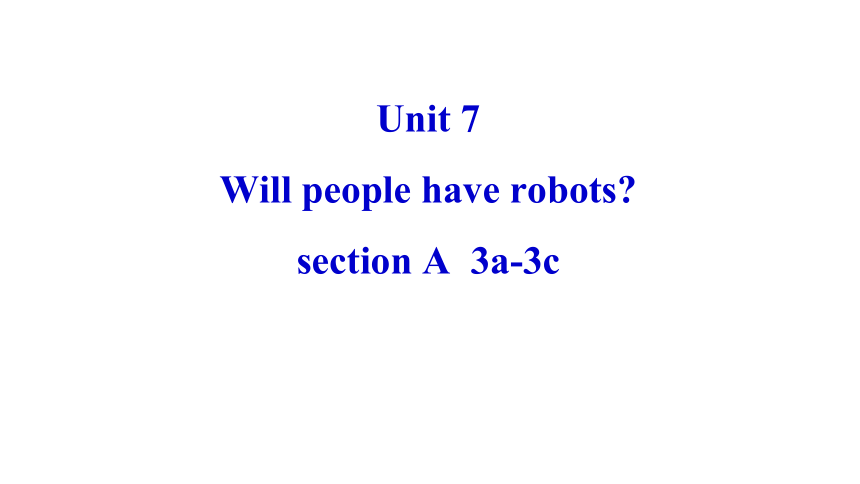 | |
| 格式 | pptx | ||
| 文件大小 | 541.1KB | ||
| 资源类型 | 教案 | ||
| 版本资源 | 人教新目标(Go for it)版 | ||
| 科目 | 英语 | ||
| 更新时间 | 2024-11-13 16:30:11 | ||
图片预览

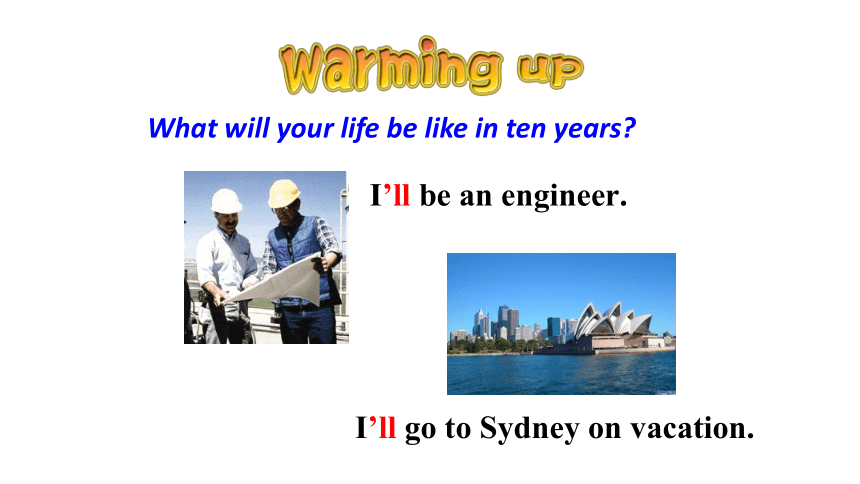
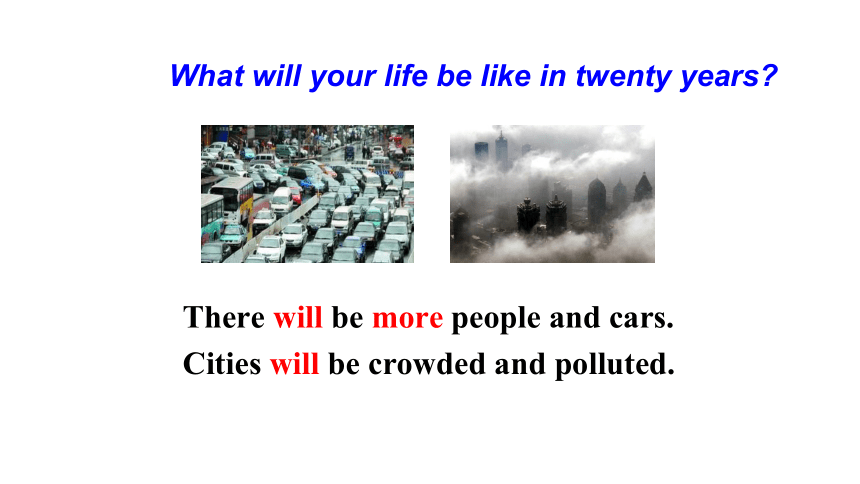
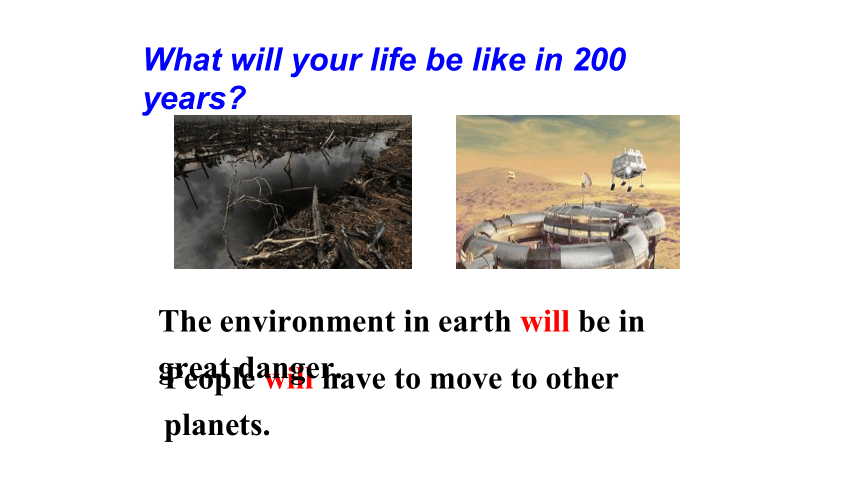
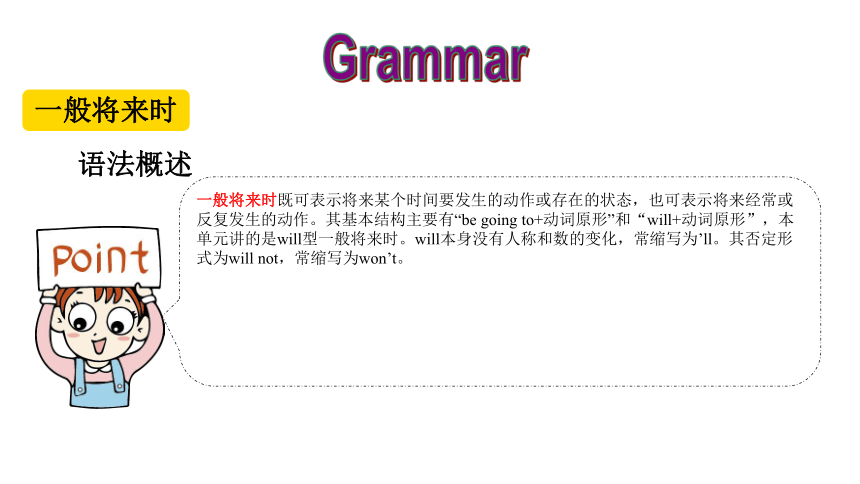
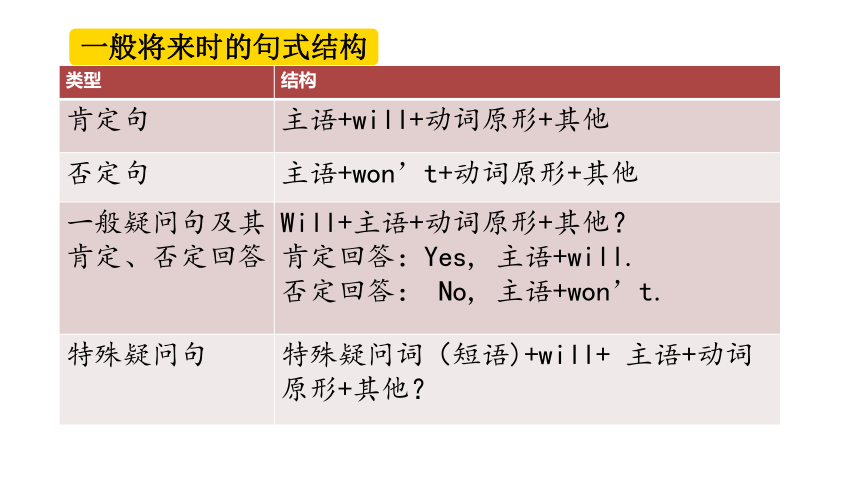
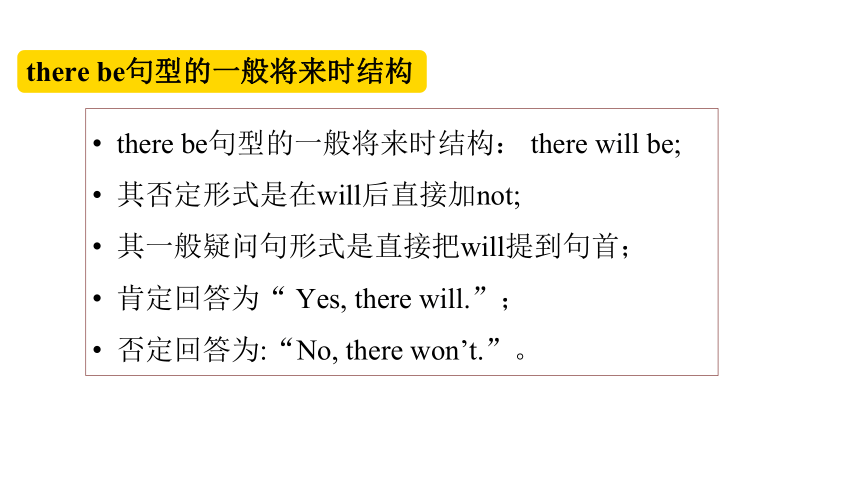
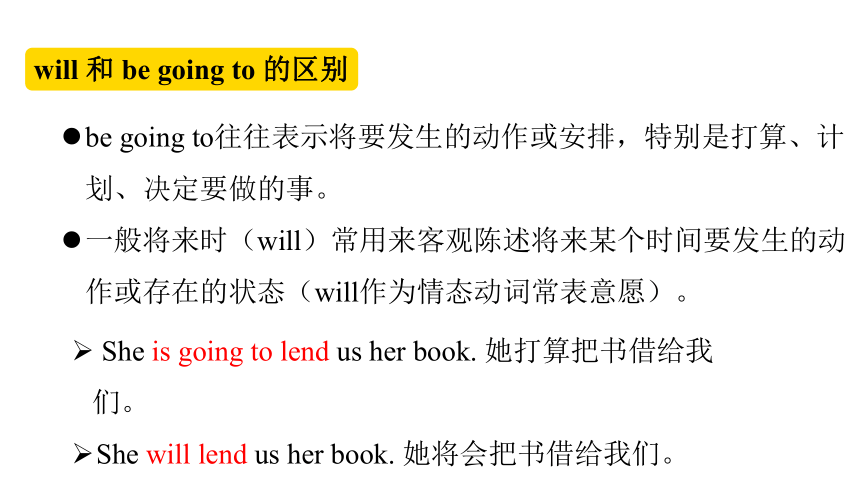
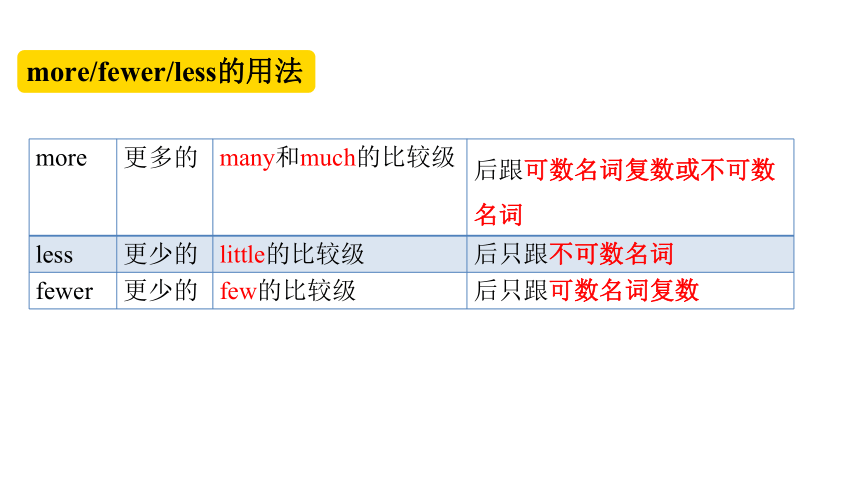
文档简介
(共22张PPT)
Unit 7
Will people have robots
section A 3a-3c
What will your life be like in ten years
I’ll be an engineer.
I’ll go to Sydney on vacation.
There will be more people and cars. Cities will be crowded and polluted.
What will your life be like in twenty years
People will have to move to other planets.
The environment in earth will be in great danger.
What will your life be like in 200 years
Grammar
一般将来时
一般将来时既可表示将来某个时间要发生的动作或存在的状态,也可表示将来经常或反复发生的动作。其基本结构主要有“be going to+动词原形”和“will+动词原形”,本单元讲的是will型一般将来时。will本身没有人称和数的变化,常缩写为’ll。其否定形式为will not,常缩写为won’t。
语法概述
一般将来时的句式结构
类型 结构
肯定句 主语+will+动词原形+其他
否定句 主语+won’t+动词原形+其他
一般疑问句及其肯定、否定回答 Will+主语+动词原形+其他?
肯定回答:Yes, 主语+will.
否定回答: No, 主语+won’t.
特殊疑问句 特殊疑问词(短语)+will+ 主语+动词原形+其他?
there be句型的一般将来时结构
there be句型的一般将来时结构: there will be;
其否定形式是在will后直接加not;
其一般疑问句形式是直接把will提到句首;
肯定回答为“ Yes, there will.”;
否定回答为:“No, there won’t.”。
be going to往往表示将要发生的动作或安排,特别是打算、计划、决定要做的事。
一般将来时(will)常用来客观陈述将来某个时间要发生的动作或存在的状态(will作为情态动词常表意愿)。
She is going to lend us her book. 她打算把书借给我们。
She will lend us her book. 她将会把书借给我们。
will 和 be going to 的区别
more/fewer/less的用法
more 更多的 many和much的比较级 后跟可数名词复数或不可数名词
less 更少的 little的比较级 后只跟不可数名词
fewer 更少的 few的比较级 后只跟可数名词复数
一般将来时(二)
语法讲解
一般将来时表示将来某个时间要发生的动作或存在的状态,也表示将来经常或反复发生的动作,常与表示将来的时间状语连用,如tomorrow,next week,next year,in the future等。
讲解来自《点拨》
一般将来时的肯定式、否定式和疑问式如下:(以go为例)
人称 肯定式 否定式 疑问式
第一人称 I/We will/shall go. I/We will/shall not go. Shall/Will I/we go
第二人称 You will go. You will not go. Will you go?
第三人称 He/She/It/They will go. He/She/It/They will not go. Will he/she/it/they go?
构成:助动词shall/will+动词原形
讲解来自《点拨》
be going to与will都可表示将要发生的事或将要去做的事,但有如下几点区别:
(1)be going to 表示近期就要发生的事情, will表示较远的将来时间发生的事。
eg: I am going to exercise for two hours this evening.
今晚我将锻炼两个小时。
He will go to America one day.
有朝一日,他将去美国。
讲解来自《点拨》
(2) be going to 根据主观判断将来肯定会发生的事情, will客观上势必发生的事情。
eg: I eat less and I am going to be thin.
我吃得少了,我将会变瘦的。
He will be twenty years old.
他将20岁了。
讲解来自《点拨》
(3)be going to 含有“计划、准备”的意思,will无此意。
eg: I am going to finish reading the book in two days.
我计划两天内读完这本书。
He will be here in half an hour.
他将在半小时后到这儿。
Fill in the blanks with more, less or fewer.
3a
1. In the future, there will be ________ fresh water because there will be _________
pollution in the sea.
2. In 100 years, there will be ________ cars because there will be _________ people in the cities.
less
more
more
more
3. There will be _______ jobs for people because _______ robots will do the same jobs as people.
4. I think there will be _______ cities because people will build ________ buildings in the country.
5. In 50 years, people will have _______ free time because there will be ________ things to do.
fewer
more
more
more
less
more
Complete the predictions with what you think will happen.
3b
1. Kids study at school now. In 100 years, _______________________________________
_______________________________________
2. I sometimes see blue skies in my city, but in the future ______________________________
_______________________________________
3. People now usually live to be about 70–80 years old, but in the future ______________
______________________________________
4. Families usually spend time together on weekends, but maybe in 200 years ________
______________________________________
3c
Draw a picture of what you think a city in the future will be like. Then describe it to the class.
I think there will be more tall buildings, and there will be fewer cars and more buses.
1. I think kids will study at home on computers ____ ten years.
A. at B. for C. after D. in
2. Hurry up! The train ____ in two minutes.
A. go B. went C. will go D. goes
3. I think that England ____ next time.
A. will win B. won C. is winning D. wins
Ⅱ. 用动词的适当形式填空。
D
A
C
Ⅲ. 根据句意及提示填空。
1. There ___________________ (be) a book sale in our school next week.
2. Listen! Susan _________ (sing) in her room.
3. Kate is 6 years old and she ________ (start) school soon.
4. Dale’s father usually ______ (read) a newspaper before breakfast.
reads
will be / is going to be
is singing
will start
一、按要求完成句子,每空一词。
1. There will be a hospital in their village.
(改为一般疑问句)
_______ _______ _______ a hospital in their village
2. Will Tom be a sports star in two years (作肯定回答)
_______, he ________.
Will there be
Yes will
即时演练
3. It will snow in the mountains tomorrow. (改为否定句)
It ________ ________ in the mountains tomorrow.
4. There is going to be an art festival on Friday.
(改为同义句)
There ________ be an art festival on Friday.
5. His father will go to Shanghai in a week.
(对画线部分提问)
______ ______ ______ his father go to Shanghai
won’t snow
will
How soon will
Unit 7
Will people have robots
section A 3a-3c
What will your life be like in ten years
I’ll be an engineer.
I’ll go to Sydney on vacation.
There will be more people and cars. Cities will be crowded and polluted.
What will your life be like in twenty years
People will have to move to other planets.
The environment in earth will be in great danger.
What will your life be like in 200 years
Grammar
一般将来时
一般将来时既可表示将来某个时间要发生的动作或存在的状态,也可表示将来经常或反复发生的动作。其基本结构主要有“be going to+动词原形”和“will+动词原形”,本单元讲的是will型一般将来时。will本身没有人称和数的变化,常缩写为’ll。其否定形式为will not,常缩写为won’t。
语法概述
一般将来时的句式结构
类型 结构
肯定句 主语+will+动词原形+其他
否定句 主语+won’t+动词原形+其他
一般疑问句及其肯定、否定回答 Will+主语+动词原形+其他?
肯定回答:Yes, 主语+will.
否定回答: No, 主语+won’t.
特殊疑问句 特殊疑问词(短语)+will+ 主语+动词原形+其他?
there be句型的一般将来时结构
there be句型的一般将来时结构: there will be;
其否定形式是在will后直接加not;
其一般疑问句形式是直接把will提到句首;
肯定回答为“ Yes, there will.”;
否定回答为:“No, there won’t.”。
be going to往往表示将要发生的动作或安排,特别是打算、计划、决定要做的事。
一般将来时(will)常用来客观陈述将来某个时间要发生的动作或存在的状态(will作为情态动词常表意愿)。
She is going to lend us her book. 她打算把书借给我们。
She will lend us her book. 她将会把书借给我们。
will 和 be going to 的区别
more/fewer/less的用法
more 更多的 many和much的比较级 后跟可数名词复数或不可数名词
less 更少的 little的比较级 后只跟不可数名词
fewer 更少的 few的比较级 后只跟可数名词复数
一般将来时(二)
语法讲解
一般将来时表示将来某个时间要发生的动作或存在的状态,也表示将来经常或反复发生的动作,常与表示将来的时间状语连用,如tomorrow,next week,next year,in the future等。
讲解来自《点拨》
一般将来时的肯定式、否定式和疑问式如下:(以go为例)
人称 肯定式 否定式 疑问式
第一人称 I/We will/shall go. I/We will/shall not go. Shall/Will I/we go
第二人称 You will go. You will not go. Will you go?
第三人称 He/She/It/They will go. He/She/It/They will not go. Will he/she/it/they go?
构成:助动词shall/will+动词原形
讲解来自《点拨》
be going to与will都可表示将要发生的事或将要去做的事,但有如下几点区别:
(1)be going to 表示近期就要发生的事情, will表示较远的将来时间发生的事。
eg: I am going to exercise for two hours this evening.
今晚我将锻炼两个小时。
He will go to America one day.
有朝一日,他将去美国。
讲解来自《点拨》
(2) be going to 根据主观判断将来肯定会发生的事情, will客观上势必发生的事情。
eg: I eat less and I am going to be thin.
我吃得少了,我将会变瘦的。
He will be twenty years old.
他将20岁了。
讲解来自《点拨》
(3)be going to 含有“计划、准备”的意思,will无此意。
eg: I am going to finish reading the book in two days.
我计划两天内读完这本书。
He will be here in half an hour.
他将在半小时后到这儿。
Fill in the blanks with more, less or fewer.
3a
1. In the future, there will be ________ fresh water because there will be _________
pollution in the sea.
2. In 100 years, there will be ________ cars because there will be _________ people in the cities.
less
more
more
more
3. There will be _______ jobs for people because _______ robots will do the same jobs as people.
4. I think there will be _______ cities because people will build ________ buildings in the country.
5. In 50 years, people will have _______ free time because there will be ________ things to do.
fewer
more
more
more
less
more
Complete the predictions with what you think will happen.
3b
1. Kids study at school now. In 100 years, _______________________________________
_______________________________________
2. I sometimes see blue skies in my city, but in the future ______________________________
_______________________________________
3. People now usually live to be about 70–80 years old, but in the future ______________
______________________________________
4. Families usually spend time together on weekends, but maybe in 200 years ________
______________________________________
3c
Draw a picture of what you think a city in the future will be like. Then describe it to the class.
I think there will be more tall buildings, and there will be fewer cars and more buses.
1. I think kids will study at home on computers ____ ten years.
A. at B. for C. after D. in
2. Hurry up! The train ____ in two minutes.
A. go B. went C. will go D. goes
3. I think that England ____ next time.
A. will win B. won C. is winning D. wins
Ⅱ. 用动词的适当形式填空。
D
A
C
Ⅲ. 根据句意及提示填空。
1. There ___________________ (be) a book sale in our school next week.
2. Listen! Susan _________ (sing) in her room.
3. Kate is 6 years old and she ________ (start) school soon.
4. Dale’s father usually ______ (read) a newspaper before breakfast.
reads
will be / is going to be
is singing
will start
一、按要求完成句子,每空一词。
1. There will be a hospital in their village.
(改为一般疑问句)
_______ _______ _______ a hospital in their village
2. Will Tom be a sports star in two years (作肯定回答)
_______, he ________.
Will there be
Yes will
即时演练
3. It will snow in the mountains tomorrow. (改为否定句)
It ________ ________ in the mountains tomorrow.
4. There is going to be an art festival on Friday.
(改为同义句)
There ________ be an art festival on Friday.
5. His father will go to Shanghai in a week.
(对画线部分提问)
______ ______ ______ his father go to Shanghai
won’t snow
will
How soon will
同课章节目录
- Unit 1 Where did you go on vacation?
- Section A
- Section B
- Unit 2 How often do you exercise?
- Section A
- Section B
- Unit 3 I'm more outgoing than my sister.
- Section A
- Section B
- Unit 4 What's the best movie theater?
- Section A
- Section B
- Unit 5 Do you want to watch a game show?
- Section A
- Section B
- Unit 6 I'm going to study computer science.
- Section A
- Section B
- Unit 7 Will people have robots?
- Section A
- Section B
- Unit 8 How do you make a banana milk shake?
- Section A
- Section B
- Unit 9 Can you come to my party?
- Section A
- Section B
- Unit 10 If you go to the party, you'll have a grea
- Section A
- Section B
